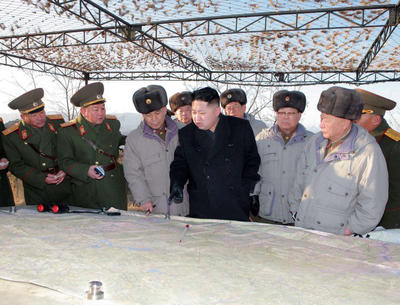As North Korea comes to grips with his death, the new government headed by Kim Jong-un — Kim Jong-il’s youngest son and successor — must begin navigating the grave challenges that North Korea faces at home and abroad.
The Kim Jong-un regime now stands at a crossroads, and the country’s future depends on whether it looks to the past or to the future in searching for the solutions to its enormous and pressing problems.
Perhaps the most serious challenge facing the new regime is the ongoing, deep-rooted economic problems that have led to chronic energy and food shortages. While North Korea rebounded from economic collapse in the late 1990s, its economy continues to be grossly insufficient in meeting the people’s basic needs. With a quarter of its population starving, the regime presides over a country where the lives of ordinary people are consumed by an ongoing struggle for subsistence.
Private markets sprang up during the 1990s as a mechanism to cope with the food shortage caused by the collapse of the Public Distribution System, and were it not for these markets, the suffering of the people would be even worse today. To make up for the shortfall of its moribund economy, North Korea is still dependent on external food and energy aid, of which China remains the majority provider.
The North Korean regime can continue to muddle through by restricting private markets and foreign investment while relying on external aid to keep the economy afloat. Or it can address the root cause of the economic problems by fundamentally changing its system through reform and opening up to foreign trade and investment. As this is the only way the regime can resolve its economic problems over the long term, the policy of muddling through will exacerbate the suffering and continue to erode the regime’s legitimacy.
The second challenge is the ongoing nuclear conflict. In the face of growing external pressure to abandon its nuclear program, North Korea has upped the ante over the past few years by engaging in ever-more serious provocations. These include conducting nuclear and missile tests in 2009; the sinking of a South Korean warship, Cheonan, in March 2010 (killing 46); and the artillery shelling of Yeonpyeong Island in November 2010 (killing four including two civilians).
These provocations are intended to escalate tension in order to break the deadlock pervading the Six-Party Talks, as well as to bolster the legitimacy of the regime and the leadership succession. But they have led to growing confrontation among all parties to the talks, and this, in turn, has increased the danger of the situation spiralling out of control into a wider conflict on the Korean Peninsula.
As such, the North Korean regime is faced with another stark choice. It can continue to muddle through by fostering conflict and tension in order to neutralise external pressure on North Korea to abandon its nuclear program, thus raising the stakes on the Korean Peninsula to an intolerably dangerous level. Or it can make a strategic choice to give up its nuclear program in return for economic aid, diplomatic ties and security guarantees, laying a solid foundation for creating a viable and secure North Korean state.
Lastly, the regime is faced with the North Korean people’s increased exposure to the outside world. Through a variety of channels — such as cross-border traffic with China, foreign radio broadcasts, expatriate North Korean communities, increasing access to mobile phones and a greater availability of foreign DVDs — the once hermetically sealed society is slowly being pried open. As North Koreans become more knowledgeable about the outside world, the more dissatisfied they will become with their own lives and the North Korean state. The regime can continue its futile effort to control information, or it can harness the increasing flow of information to help develop the country as part of a broader effort to open up North Korean society to the outside world.
While the death of an important historical figure usually marks the end of one era and the beginning of a new one, the death of Kim Jong-il has only increased the urgent need for his successor to make difficult choices. Either the regime must be willing to take the country in a new and bold direction or it must suffer the consequences of maintaining an unsustainable status quo.
Steven Kim is Professor at the Asia-Pacific Center for Security Studies, Honolulu.
The views expressed in this article are those of the author and do not reflect the official policy or position of APCSS, the US Pacific Command, the US Department of Defense, or the US government.

